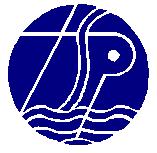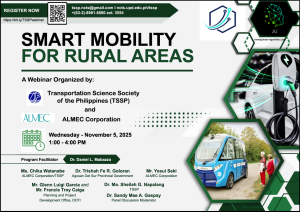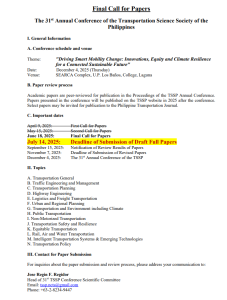HISTORY OF TSSP
The Transportation Science Society of the Philippines (TSSP) was formally established on 22 September 1993, when the organization was incorporated with the Securities and Exchange Commission (SEC). Prior to the formal establishment of the society, the idea of an organization of professionals and academics in the field of transportation in the Philippines was conceived much earlier. A group of Japanese professors led by Dr. Shigeru Morichi was then on assignment in the country as Visiting Professors from their respective universities as part of a bilateral project supported by the Japan International Cooperation Agency (JICA) to train more Filipinos in the field of transportation, and establish the first post-graduate programs in transport and traffic in the country. The project transformed the former Transport Training Center (TTC) into the National Center for Transportation Studies (NCTS).
The idea to establish the TSSP snowballed with the involvement of Dr. Reynaldo B. Vea who was then Dean of the UP College of Engineering and Dr. Primitivo C. Cal who was then Director of TTC. Eventually, a core group was formed that included Engr. Manuel M. Bonoan, then Undersecretary of the Department of Public Works and Highways (DPWH), Engr. Ruben S. Reinoso, Assistant Director General of the National Economic and Development Authority (NEDA), Mr. Salvador O. Rivera then of the Metropolitan Manila Development Authority (MMDA), Mr. Francis C. Carlos of San Miguel Corporation, Mr. Cesar T. Valbuena then Assistant Secretary of the Department of Transportation and Communications (DOTC), Mr. Honorio R. Vitasa also of the DOTC, Dr. Shizuo Iwata of ALMEC Corporation, and Mr. Rene S. Santiago. These became the incorporators and founding Board of Directors of the TSSP, with most still actively involved with the society. In the last 25 years, the Society has had 9 presidents. These are Dr. Primitivo C. Cal, Mr. Rene S. Santiago, Mr. Cesar T. Valbuena, Mr. George Esguerra, Dr. Crispin Emmanuel D. Diaz, Dr. Hussein S. Lidasan, Dr. Reynaldo B. Vea, Dr. Alexis M. Fillone, and the current president, Dr. Ricardo DG. Sigua.
The TSSP holds annual conferences and as befits its broad range of membership, the theme and content of papers have pivoted between its academic and practical impulses. Majority of the papers presented at the annual conferences were academic, the product of researches at the leading universities in the Philippines. Other papers focused on the practical aspects of the transportation field including projects and innovative solutions to transport and traffic problems. Other activities organized or participated in by TSSP are symposia, seminars, public discussion forums, and ad hoc multi-sectoral technical working groups tackling current and pressing issues in transportation. In 2011, the TSSP cooperated with leading universities with programs in transportation including the University of the Philippines, De La Salle University and Mapua Institute of Technology to organize what is now an annual Student Conference on Transportation Research (SCTR). Through the SCTR, the TSSP has been able to encourage research in the field of transportation and attract the attention of young minds to contribute in solving problems in transport and traffic.
The establishment of the TSSP marked the beginning of initiatives towards the establishment of an even bigger society. The Eastern Asia Society for Transportation Studies (EASTS) was formed in 1994 and now consists of 19 member societies representing countries/regions in Eastern Asia. Aptly, the first international conference of EASTS was hosted by the Philippines in 1995. This was followed by nine conferences held biennially. At the 5th EASTS Conference held in Fukuoka, Japan, the Philippines won the Best Domestic Society Award – an honor not always bestowed as there were years when no domestic society met the criteria. The EASTS Conference was last held in the Philippines in Cebu City on September 11-13, 2015 with the 11th International Conference held at the Radisson Blu Hotel.
OBJECTIVES
TSSP has the following objectives:
1. To contribute to the growth of transportation sciences and the development of transportation systems.
2. To provide opportunities for the professional growth of its members.
3. To expand the pool of transportation science experts through educational programs, researches and publications.
ACTIVITIES OF THE SOCIETY
The activities of the Society include:
1. Conduct of conferences, symposium, seminars and workshops.
2. Publication of technical materials such as books, journals, proceedings, monographs and others.
3. Conduct of researches on transportation.
4. Recognition of outstanding researches and accomplishments in the field of transportation.
5. Established of linkages with other national and international societies in transportation sciences and related disciplines.
MEMBERSHIP CLASSIFICATION AND REQUIREMENTS
1. Regular members refer to those who possess the following qualifications and have the recommendation of at least two regular members, endorsement of the Membership Committee, and approval of the Board of Directors of the Society.
a) Are recognized experts in transportation; or
b) Have written/published at least two technical papers in recognized journals and proceedings in the field of transportation*; or
c) Holders of master’s degree or doctoral degree in transportation*.
*proof of qualification should be submitted together with the application form
2. Honorary members are those who have made exemplary contribution in the field of transportation has been approved by the General Membership, on the recommendation of the Board of Directors.
3. Corporate members are juridical members whose membership has been approved by the Board of Directors, on the recommendation of the Membership Committee.
4. Associate members are students who are pursuing a master’s or doctoral degree in the field of transportation or professionals pursuing a career in transportation and/or its related fields and whose membership as such has been approved by the Board of Directors, on the recommendation of the Membership Committee.
5. Student members are students who are authors of papers submitted and accepted in TSSP and EASTS (Eastern Asia Society for Transportation Studies) conferences and/or those who are members of student chapters recognized by TSSP but not necessarily qualify as associate members, and whose membership as such has been approved by the Board of Directors, on the recommendation of the Membership Committee. Student membership has a validity of one year. Student members are encouraged to upgrade their membership status to associate or regular.
FEES AND DUES
New members, except honorary members, shall pay the following entrance fees immediately upon notification of their acceptance and prior to their induction.
- Regular Members: Php 1,000.00
- Associate Members: Php 500.00
- Student Members: Php 200.00
- Corporate Members: Php 5,000.00
Annual dues shall be levied upon all Regular Members, Associate Members, Student Members and Corporate Members at the rate of Php 1,500.00, Php 800.00, Php 300.00 and Php 10,000.00, respectively. Any regular member who has been a member in good standing** for at least seven (7) consecutive years may be exempted from the payment of annual dues for life upon the payment of Php 10,000.
** Requirements for Lifetime Membership
To be considered for TSSP lifetime membership, the applicant, for the past seven (7) consecutive years:
- must have good membership standing1, and
- must have actively, and consistently participated in TSSP activities2 as a demonstration of commitment to the Society.
- The applicant must also pay the lifetime membership fee of PhP10,000.
1 good membership standing: – attendance in TSSP organized and accredited conferences/fora – paid membership and conference fees 2 active participation in activities: – presented a paper, served as speaker, served as resource person, or served as session moderator in TSSP-organized conferences/fora; or – served as paper referee; or – served as member of committees (e.g. conference organizing committee, or other regular committees); or – provided substantial sponsorship (in cash or kind) to TSSP activities.
The revised membership classification, requirements and schedule of fees and dues shall take effect in 2023 except for Student Member and Lifetime Member which became effective on 25 November 2022.


